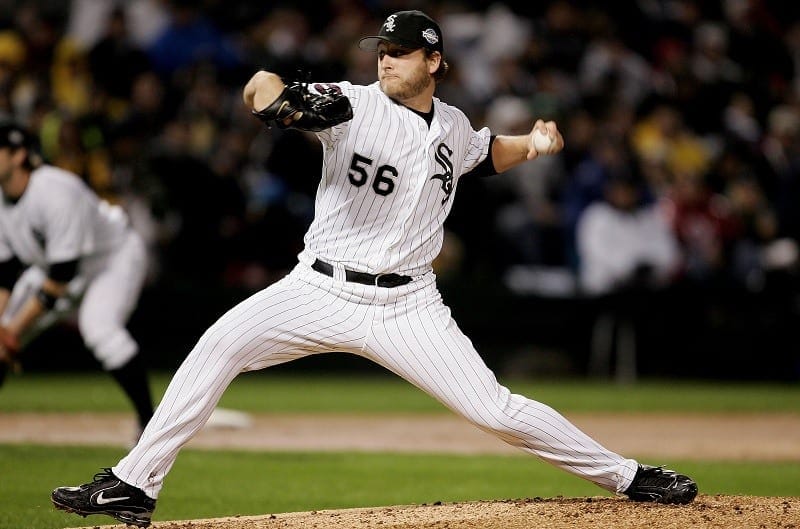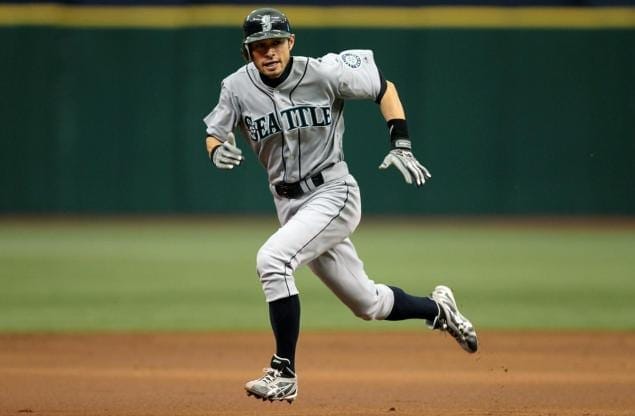
We love streaks in sports. We look at every little statistic in every sport to find something to put in the record books. Well, on July 19, 2017, another record streak came to an end. Milwaukee Brewers closer Corey Knebel’s record breaking streak of at least one strikeout in 46 straight appearances came to an end when he blew a lead against the Pittsburgh Pirates. Knebel allowed a walk and two singles that tied the game. A fly ball to center secured the comeback win for the Pirates and Knebel lost both the game and his streak.
In honor of his streak, and his name being written in the record books, we decided to take a look at the nine greatest streaks in MLB history:
Longest hitting streak: Joe DiMaggio, 56 games
Joe DiMaggio’s hitting streak is possibly the greatest and toughest streak to break in the history of the league. In 1941, DiMaggio’s sixth season in the league, the centerfielder recorded a hit in 56 games straight. DiMaggio’s streak began on May 15th and lasted until July 17th. During the streak he batted .408, hit 15 home runs and recorded 55 RBIs.
He failed to get a hit on that July 17th, but the following day started another hitting streak of 17 games. He recorded at least one hit in 73 of 74 games. Needless to say he was the MVP that season, his second of three MVP titles.
Longest regular-season streak without a loss: New York Giants, 26 games
This streak has held strong for over 100 years. In 1916, the New York Giants played 26 games without a single loss, putting them back in the playoff race. Before the streak they had a record of 60-62 and they were 14 games behind the leader. By the end of their streak their record stood at 86-62 and were only five games out of first place. The one game during the streak they did not win was a tied game against the Pirates on September 18th.
Unfortunately for the Giants, even with the impressive streak they finished fourth in the National League.
Consecutive games: Cal Ripken Jr., 2,632 games

Cal Ripken Jr. did not miss a single game from May 30, 1982 through September 19, 1998. It amounted to 2,638 games, the longest streak of consecutive games played ever. Ripken smashed the previous record held by Yankees legend Lou Gehrig by over 500 games (Gehrig’s record was 2,130 consecutive games).
To put it in perspective, Ripken’s streak lasted through three different presidents and he played even after twisting his right knee in a brawl.
During his streak Ripken won Rookie of the Year and was twice the MVP.
Longest postseason winning streak: New York Yankees, 12 games (twice)
The longest postseason winning streaks belong to no other than the Evil Empire, the New York Yankees. Their first streak of 12 consecutive wins was from October 5, 1927 to October 2, 1932, when the postseason consisted of a single series. In 1927, a year after losing in the World Series, they swept the Pittsburgh Pirates. The following years they swept the St. Louis Cardinals. They failed to make the postseason in 1929, 1930 and 1931, but when they finally made it back to the World Series in 1932 they swept the Chicago Cubs.
Their next streak came in the late 1990s, from October 10, 1998 to October 14, 1999. The Yankees lost two games to the Cleveland Indians in the AL Championship series, the second and third game, but starting with Game 4 they won 12 straight, stretching to the next season. They won Games 4, 5 and 6 to put away the Indians then swept the San Diego Padres to win the World Series. The following season they swept the three-game division series against the Rangers, and won two more against the Red Sox in the ALCS before losing a game and breaking the streak. But still, after that one loss to Boston they won two more to win the series and swept the Braves in the World Series.
Consecutive seasons with 300+ strikeouts: Randy Johnson, 5 seasons
Randy Johnson spent 22 seasons pitching in the MLB and has a long list of accomplishments. He threw a no-hitter in 1990, and a perfect game in 2004. But between those no-no’s, from 1998 through 2002, Johnson struck out at least 300 batters per season. In 2001 he even struck out 372 batters.
The Hall of Famer was a triple crown winner, World Series MVP, four-time ERA title holder, ten-time All Star, five-time Cy Young Winner and a World Series champion.
Consecutive perfect innings pitched: Mark Buehrle, 15 innings

Mark Buehrle pitched 12 seasons for the Chicago White Sox. During his eighth season, in 2007, he tossed a no-hitter. But his impressive streak, of consecutive perfect innings, came in 2009, when he pitched 15 perfect innings between July 18th through July 28th. The streak, of course, included a perfect game against the Tampa Bay Rays on July 23rd.
Consecutive games with a HR: Ken Griffey Jr., Don Mattingly and Dale Long, 8 games
Three different players have reached this feat, hitting at least one home run in eight straight games. Dale Long of the Pirates was the first, hitting eight home runs in eight straight games in 1956. His record stood for 31 years until 1987, when Don Mattingly was able to tie it. Ken Griffey Jr. was the last to reach at least one home run in eight straight games between July 20-28, 1993.
Consecutive seasons with 40+ home runs: Babe Ruth, 7 seasons
Babe Ruth set many records back in the day. His seven consecutive seasons with 40+ home runs still stands today. Alex Rodriguez had two streaks of six seasons with 40+ home runs, but couldn’t reach that coveted seventh season. Sammy Sosa also fell short by a single season. The Sultan of Swat’s streak lasted from 1926-1932 and included a 60 home run season in 1927.
Consecutive 200+ hit seasons: Ichiro Suzuki, 10 seasons

Ichiro Suzuki will likely end up in the Hall of Fame. The Rookie of the Year and MVP in 2001 tallied 242 hits during his first season in the MLB. It was the first of ten consecutive seasons in which Ichiro recorded 200+ hits. At 43 years old he’s still playing, but he hasn’t had a 200+ hit season since the streak ended after the 2010 season.

The greatest NBA dynasties of all time
The goal for any basketball franchise is to build a dynasty that fans and experts will be talking about for











